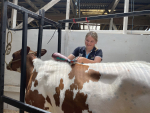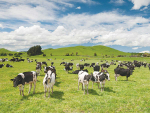When Manawatu dairy farmer Kelly Powell talks about Holstein-Friesian cows you can hear the excitement and passion in her voice.
A passion, which started on her aunt's farm in Shannon as a small girl, has now been realised running a 500 strong herd with husband Brad at their Ridgeline Farm in the Manawatu.
This pair were recognised by the Holstein Friesian Society for having the highest earning herd in 2014/15 for Manawatu, Hawkes Bay/Wairarapa and second in New Zealand.
Powell also a World Wide Sires breeding consultant says selective breeding contributed heavily to this result with about 90% of the herd descended from international sires through WWS.
"I artificially inseminate all our cows and like to know they're going to hold and get in calf. Otherwise it's going to end up costing a lot of money," Powell says.
"Ten per cent of our herd isn't from WWS. It's great to have a comparison and to have a bench mark."
WWS commitment to genetics sees Powell part of a growing nationwide team delivering a face to face service for the company that has now been in NZ for 35 years.
She says she wants to get farmers talking and thinking about breeding, something she believes has been somewhat forgotten about. Powell is a big advocate of getting in front of the farmer and being there from the start to end process.
"We (WWS) do nice, well-bred cows. New Zealand's a small place. We bring the rest of the world to the table and we bring an animal of good size for farming systems." Powell says.
"I love looking at good quality cows. Farmers don't like change but the low payout has got people questioning productivity and the quality of the bulls being used. You want to know with the bulls you select you are going to improve your herd and not go backwards."
The company's World Wide Mating Service is a scientific programme, which utilises advanced computer technology to improve each cow and take the guesswork out of mating. The programme is the world's largest and most successful mating programme, last year over 6.1 million cows in 50 countries were mated with WMS.


















